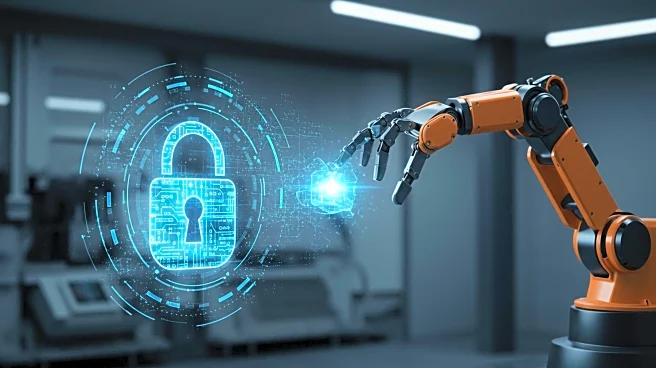What's Happening?
Manufacturers globally are increasingly investing in artificial intelligence (AI) and smart manufacturing technologies to tackle ongoing labor shortages, skills gaps, and rising cybersecurity threats. This trend is highlighted in Rockwell Automation's 10th annual State of Smart Manufacturing Report, which surveyed 1,560 manufacturing leaders across 17 major manufacturing nations. The report reveals that 56% of manufacturers are piloting smart manufacturing initiatives, with 20% having implemented them at scale. AI and machine learning are being utilized for quality control, process optimization, and cybersecurity. Economic pressures such as inflation and slow growth, along with cybersecurity risks, are significant concerns for these manufacturers. The report also notes that supply chain disruptions continue to pose challenges, prompting some manufacturers to consider reshoring and nearshoring strategies.
Why It's Important?
The adoption of AI in manufacturing is crucial as it addresses several pressing issues faced by the industry. By leveraging AI, manufacturers can enhance efficiency, improve product quality, and strengthen cybersecurity measures. This technological shift is not only about replacing human labor but also about transforming roles and requiring new skill sets. As AI becomes more integrated, it offers potential cost reductions and efficiency gains, which are vital for maintaining competitiveness in a global market. The focus on AI also reflects a broader trend towards sustainability and resilience in supply chains, which is increasingly important in the face of global trade volatility.
What's Next?
Looking forward, manufacturers are expected to continue investing in AI and machine learning technologies, with 95% of survey respondents planning to do so within the next five years. This investment is seen as essential for achieving cost reductions, efficiency improvements, and supply chain resilience. The report emphasizes the need for continuous workforce development and the integration of secure digital architectures to sustain competitiveness. As AI adoption accelerates, manufacturers will need to balance technological advancements with workforce training to ensure a smooth transition and maximize the benefits of these technologies.
Beyond the Headlines
The increasing reliance on AI in manufacturing raises important ethical and workforce considerations. As roles shift, there is a need for policies that support workforce retraining and development to ensure that employees can adapt to new technology-driven roles. Additionally, the integration of AI in manufacturing processes must be managed carefully to address potential cybersecurity vulnerabilities. The focus on sustainability and efficiency also highlights the industry's role in addressing broader environmental challenges, making AI a critical tool in the pursuit of more sustainable manufacturing practices.









